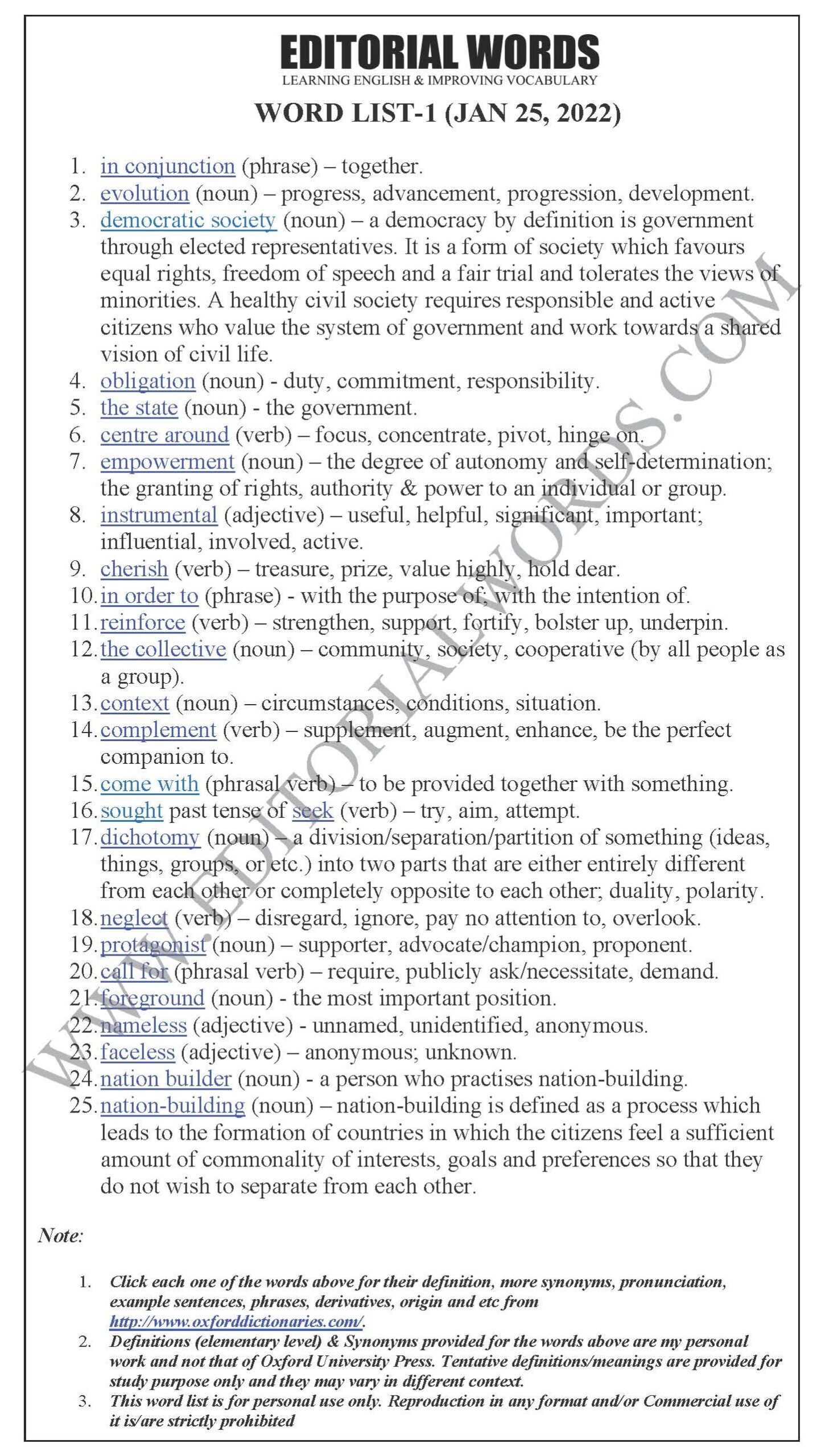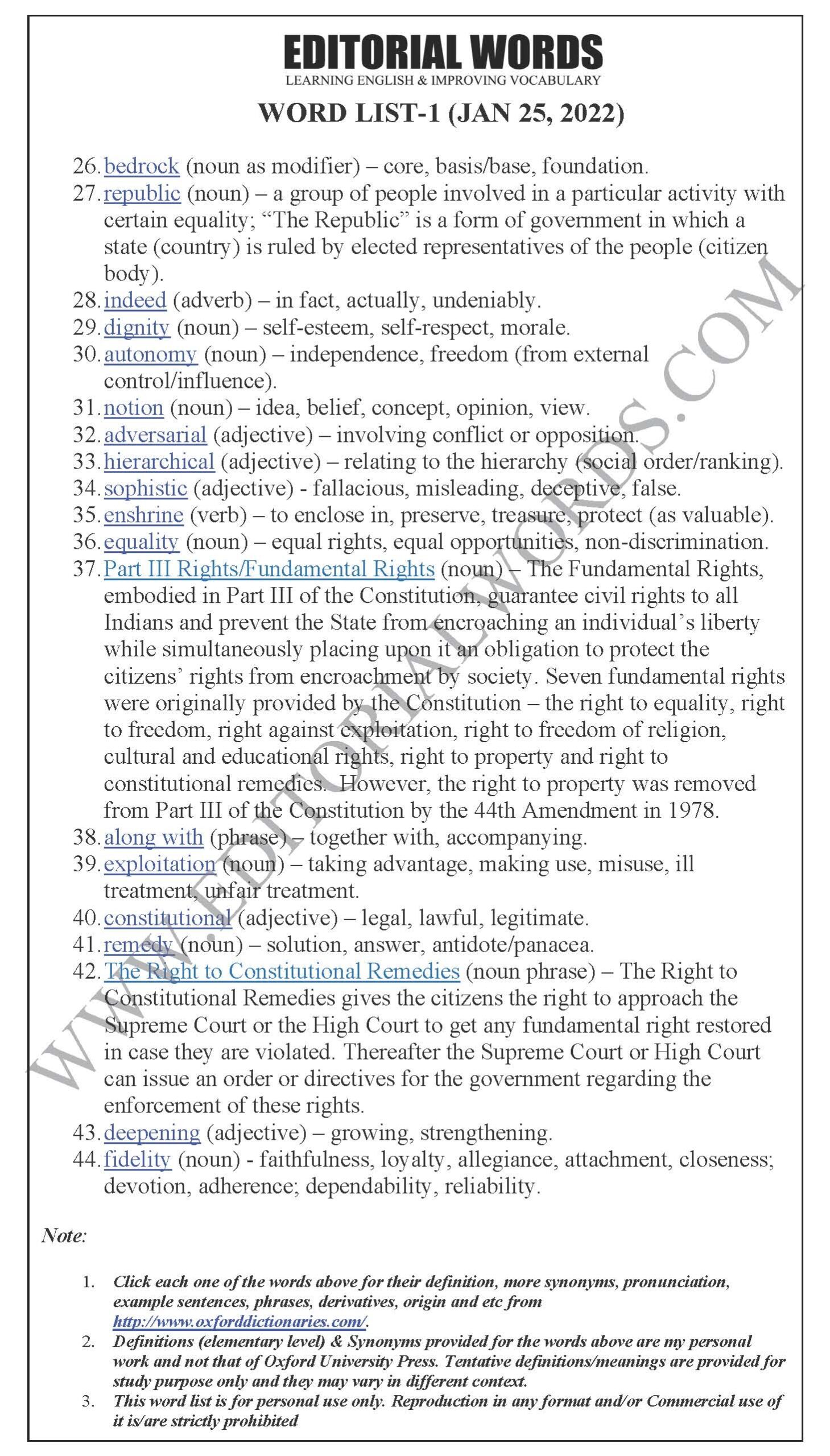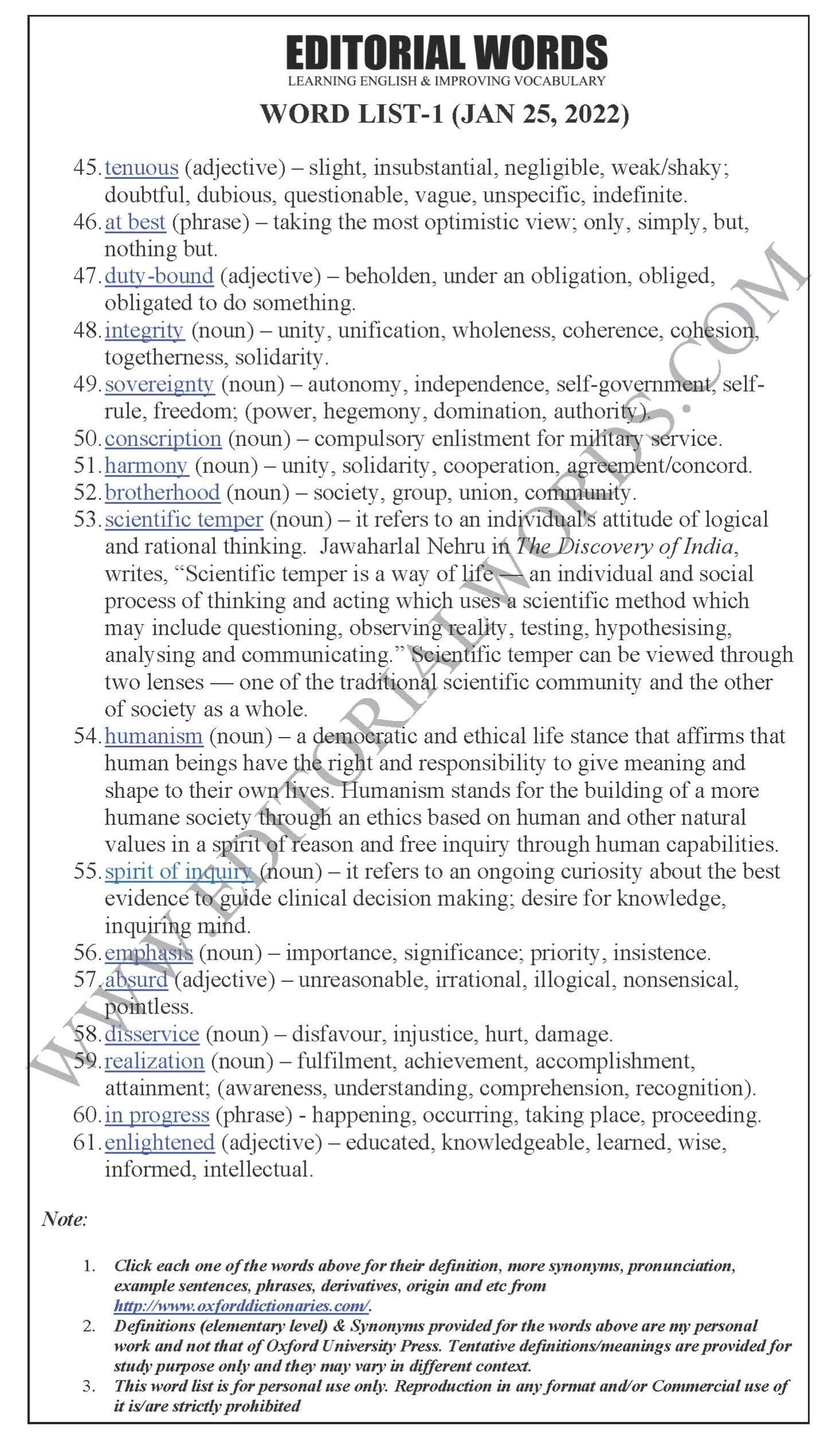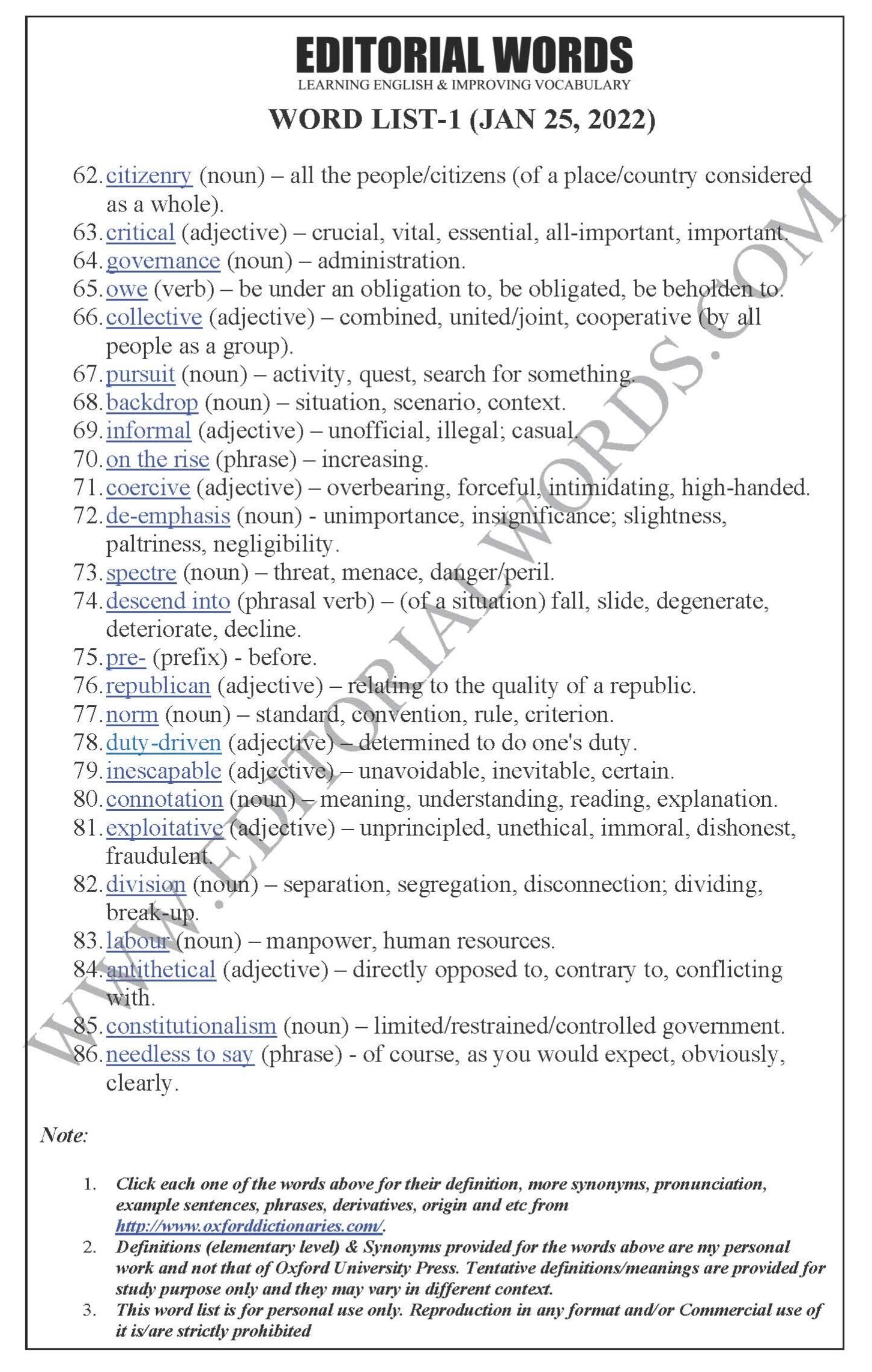The Hindu Editorial (In conjunction) – Jan 25, 2022
The evolution of a democratic society is centred around the expansion of rights — civil, political, economic and cultural, leading to the empowerment of people. For further reading, visit “The Hindu”. Below is today’s word list-1 for The Hindu Editorial (In conjunction) – Jan 25, 2022.
To read this article, click “The Hindu”.
This preview is provided here with permission.
Courtesy: The Hindu
The Hindu Editorial (In conjunction) – Jan 25, 2022:
- in conjunction (phrase) – together.
- evolution (noun) – progress, advancement, progression, development.
- democratic society (noun) – a democracy by definition is government through elected representatives. It is a form of society which favours equal rights, freedom of speech and a fair trial and tolerates the views of minorities. A healthy civil society requires responsible and active citizens who value the system of government and work towards a shared vision of civil life.
- obligation (noun) – duty, commitment, responsibility.
- the state (noun) – the government.
- centre around (verb) – focus, concentrate, pivot, hinge on.
- lead to (verb) – result in, cause, bring on, bring about.
- empowerment (noun) – the degree of autonomy and self-determination; the granting of rights, authority & power to an individual or group.
- instrumental (adjective) – useful, helpful, significant, important; influential, involved, active.
- cherish (verb) – treasure, prize, value highly, hold dear.
- in order to (phrase) – with the purpose of; with the intention of.
- reinforce (verb) – strengthen, support, fortify, bolster up, underpin.
- the collective (noun) – community, society, cooperative (by all people as a group).
- context (noun) – circumstances, conditions, situation.
- complement (verb) – supplement, augment, enhance, be the perfect companion to.
- come with (phrasal verb) – to be provided together with something.
- sought past tense of seek (verb) – try, aim, attempt.
- dichotomy (noun) – a division/separation/partition of something (ideas, things, groups, or etc.) into two parts that are either entirely different from each other or completely opposite to each other; duality, polarity.
- neglect (verb) – disregard, ignore, pay no attention to, overlook.
- protagonist (noun) – supporter, advocate/champion, proponent.
- call for (phrasal verb) – require, publicly ask/necessitate, demand.
- foreground (noun) – the most important position.
- nameless (adjective) – unnamed, unidentified, anonymous.
- faceless (adjective) – anonymous; unknown.
- nation builder (noun) – a person who practises nation-building.
- nation-building (noun) – nation-building is defined as a process which leads to the formation of countries in which the citizens feel a sufficient amount of commonality of interests, goals and preferences so that they do not wish to separate from each other.
- bedrock (noun as modifier) – core, basis/base, foundation.
- republic (noun) – a group of people involved in a particular activity with certain equality; “The Republic” is a form of government in which a state (country) is ruled by elected representatives of the people (citizen body).
- indeed (adverb) – in fact, actually, undeniably.
- dignity (noun) – self-esteem, self-respect, morale.
- autonomy (noun) – independence, freedom (from external control/influence).
- notion (noun) – idea, belief, concept, opinion, view.
- adversarial (adjective) – involving conflict or opposition.
- hierarchical (adjective) – relating to the hierarchy (social order/ranking).
- sophistic (adjective) – fallacious, misleading, deceptive, false.
- enshrine (verb) – to enclose in, preserve, treasure, protect (as valuable).
- equality (noun) – equal rights, equal opportunities, non-discrimination.
- Part III Rights/Fundamental Rights (noun) – The Fundamental Rights, embodied in Part III of the Constitution, guarantee civil rights to all Indians and prevent the State from encroaching an individual’s liberty while simultaneously placing upon it an obligation to protect the citizens’ rights from encroachment by society. Seven fundamental rights were originally provided by the Constitution – the right to equality, right to freedom, right against exploitation, right to freedom of religion, cultural and educational rights, right to property and right to constitutional remedies. However, the right to property was removed from Part III of the Constitution by the 44th Amendment in 1978.
- along with (phrase) – together with, accompanying.
- exploitation (noun) – taking advantage, making use, misuse, ill treatment, unfair treatment.
- constitutional (adjective) – legal, lawful, legitimate.
- remedy (noun) – solution, answer, antidote/panacea.
- The Right to Constitutional Remedies (noun phrase) – The Right to Constitutional Remedies gives the citizens the right to approach the Supreme Court or the High Court to get any fundamental right restored in case they are violated. Thereafter the Supreme Court or High Court can issue an order or directives for the government regarding the enforcement of these rights.
- deepening (adjective) – growing, strengthening.
- fidelity (noun) – faithfulness, loyalty, allegiance, attachment, closeness; devotion, adherence; dependability, reliability.
- tenuous (adjective) – slight, insubstantial, negligible, weak/shaky; doubtful, dubious, questionable, vague, unspecific, indefinite.
- at best (phrase) – taking the most optimistic view; only, simply, but, nothing but.
- duty-bound (adjective) – beholden, under an obligation, obliged, obligated to do something.
- integrity (noun) – unity, unification, wholeness, coherence, cohesion, togetherness, solidarity.
- sovereignty (noun) – autonomy, independence, self-government, self-rule, freedom; (power, hegemony, domination, authority).
- conscription (noun) – compulsory enlistment for military service.
- harmony (noun) – unity, solidarity, cooperation, agreement/concord.
- brotherhood (noun) – society, group, union, community.
- scientific temper (noun) – it refers to an individual’s attitude of logical and rational thinking. Jawaharlal Nehru in The Discovery of India, writes, “Scientific temper is a way of life — an individual and social process of thinking and acting which uses a scientific method which may include questioning, observing reality, testing, hypothesising, analysing and communicating.” Scientific temper can be viewed through two lenses — one of the traditional scientific community and the other of society as a whole.
- humanism (noun) – a democratic and ethical life stance that affirms that human beings have the right and responsibility to give meaning and shape to their own lives. Humanism stands for the building of a more humane society through an ethics based on human and other natural values in a spirit of reason and free inquiry through human capabilities.
- spirit of inquiry (noun) – it refers to an ongoing curiosity about the best evidence to guide clinical decision making; desire for knowledge, inquiring mind.
- emphasis (noun) – importance, significance; priority, insistence.
- absurd (adjective) – unreasonable, irrational, illogical, nonsensical, pointless.
- disservice (noun) – disfavour, injustice, hurt, damage.
- realization (noun) – fulfilment, achievement, accomplishment, attainment; (awareness, understanding, comprehension, recognition).
- in progress (phrase) – happening, occurring, taking place, proceeding.
- enlightened (adjective) – educated, knowledgeable, learned, wise, informed, intellectual.
- citizenry (noun) – all the people/citizens (of a place/country considered as a whole).
- critical (adjective) – crucial, vital, essential, all-important, important.
- governance (noun) – administration.
- owe (verb) – be under an obligation to, be obligated, be beholden to.
- collective (adjective) – combined, united/joint, cooperative (by all people as a group).
- pursuit (noun) – activity, quest, search for something.
- backdrop (noun) – situation, scenario, context.
- informal (adjective) – unofficial, illegal; casual.
- on the rise (phrase) – increasing.
- coercive (adjective) – overbearing, forceful, intimidating, high-handed.
- de-emphasis (noun) – unimportance, insignificance; slightness, paltriness, negligibility.
- spectre (noun) – threat, menace, danger/peril.
- descend into (phrasal verb) – (of a situation) fall, slide, degenerate, deteriorate, decline.
- pre- (prefix) – before.
- republican (adjective) – relating to the quality of a republic.
- norm (noun) – standard, convention, rule, criterion.
- duty-driven (adjective) – determined to do one’s duty.
- inescapable (adjective) – unavoidable, inevitable, certain.
- connotation (noun) – meaning, understanding, reading, explanation.
- exploitative (adjective) – unprincipled, unethical, immoral, dishonest, fraudulent.
- division (noun) – separation, segregation, disconnection; dividing, break-up.
- labour (noun) – manpower, human resources.
- antithetical (adjective) – directly opposed to, contrary to, conflicting with.
- constitutionalism (noun) – limited/restrained/controlled government.
- needless to say (phrase) – of course, as you would expect, obviously, clearly.
Note:
1. Click each one of the words above for their definition, more synonyms, pronunciation, example sentences, phrases, derivatives, origin and etc from http://www.oxforddictionaries.com/.
2. Definitions (elementary level) & Synonyms provided for the words above are my personal work and not that of Oxford University Press. Tentative definitions/meanings are provided for study purpose only and they may vary in a different context.
3. This word list is for personal use only. Reproduction in any format and/or Commercial use of it is/are strictly prohibited.
The Hindu Editorial (In conjunction) – Jan 25, 2022:




“Phrasal Verbs” We Learnt Last Week
“Idioms & Phrases” We Learnt Last Week
“Important Definitions” We Learnt Last Week
Recent Word Lists For The Hindu Editorial Articles

Be the first to comment